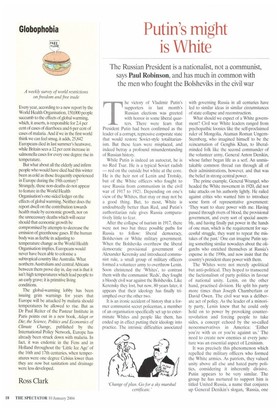Globophobia
A weekly survey of world restrictions on freedom and free trade Every year, according to a new report by the World Health Organisation, 150,000 people succumb to the effects of global warming, which, it asserts, is responsible for 2.4 per cent of cases of diarrhoea and 6 per cent of cases of malaria. And if we in the first world think we can feel smug, it adds, 25,842 Europeans died in last summer's heatwave, while Britain sees a 12 per cent increase in salmonella cases for every one degree rise in temperature.
But what about all the elderly and infirm people who would have died had this winter been as cold as those frequently experienced in Europe during the 19th century? Strangely, these non-deaths do not appear to feature in the World Health Organisation's one-sided ledger on the effects of global warming. Neither does the report dwell on the contribution towards health made by economic growth, nor on the unnecessary deaths which will occur should that economic growth be compromised by attempts to decrease the emission of greenhouse vices. If the human body was as feeble in adjusting to temperature change as the World Health Organisation implies, Europeans would never have been able to colonise a subtropical country like Australia. What northern Australians and central Africans between them prove day in, day out is that it isn't high temperatures which lead people to an early grave; it is primitive living conditions.
The global-warming lobby has been issuing grim warnings for years that Europe will be attacked by malaria should temperatures be allowed to rise. But as Dr Paul Reiter of the Pasteur Institute in Paris points out in a new book, Adapt or Die; the Science, Politics and Economics of Climate Change, published by the International Policy Network, Europe has already been struck down with malaria. In fact, it was endemic in the Fens and in Holland throughout the 'Little Ice Age' of the 16th and 17th centuries, when temperatures were one degree Celsius lower than they are now but sanitation and drainage were less developed.
Ross Clark


























































 Previous page
Previous page